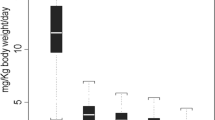Abstract
Although acute rejection (AR) has been shown to correlate with decreased long-term renal allograft survival, we have noted AR in recipients who subsequently had stable function for more than 5 years. We reviewed 109 renal graft recipients with a minimum of 1 year graft survival and follow-up of 5–8 years. Post-transplant sodium iothalamate clearances (IoCl) measured at 3 months and yearly thereafter were used to separate recipients into 2 groups. In 61 patients (stable group), there was no significant decrease ( > 20 % reduction in IoCl over 2 consecutive years) in IoCl. Forty-eight patients had significant declines in IoCl (decline group). Groups were compared for incidence, severity, timing, and completeness of reversal of AR. Rejection was considered completely reversed if the post-AR serum creatinine (Scr) returned to or below the pre-AR nadir Scr after antirejection therapy. The incidence of AR was not significantly different between groups (47 % vs 52 %). A trend toward a lower mean number of AR episodes per patient was noted in the stable group (0.69 vs 1.04, P = 0.096), but the timing of AR was not different. Steroid-resistant AR occurred in approximately 25 % of both groups. A striking difference was seen in complete reversal of AR, with the stable group having 100 % (42/42 episodes of AR in 29 patients) complete reversal whereas only 32 % (8/25) of the patients in the decline group had complete reversal (P < < 0.001). Of 8 declining patients with complete reversal, graft loss was due to chronic rejection (CR) in only 3. Seventeen declining patients had incomplete reversal of AR, and 82 % (14/17) lost their grafts to CR. Overall, only 8 % (3/37) of the recipients with complete reversal of AR developed CR. No patients with incompletely reversed AR had stable long-term function as measured by IoCl. AR is not invariably deleterious to long-term renal graft function if each episode of AR can be completely reversed.
Similar content being viewed by others
Author information
Authors and Affiliations
Additional information
Received: 9 March 1999/Revised: 28 December 2000/Accepted: 11 April 2000
About this article
Cite this article
Madden, R., Mulhern, J., Benedetto, B. et al. Completely reversed acute rejection is not a significant risk factor for the development of chronic rejection in renal allograft recipients. Transpl Int 13, 344–350 (2000). https://doi.org/10.1007/s001470050712
Issue Date:
DOI: https://doi.org/10.1007/s001470050712




